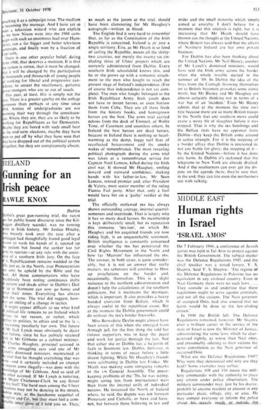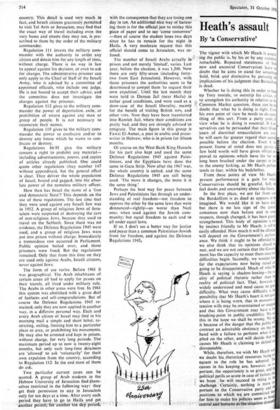MIDDLE EAST
Human rights in Israel
`ISRAEL AMOS'
On 7 February 1946. a conference of Jewish jurists was held in Tel Aviv to protest against the British Government. The subject matter was the Defence Regulations 1945, and the chief speaker was a noted lawyer, Y. S. Shapira. Said Y. S. Shapira: 'The regime of the Defence Regulations in Palestine has no equivalent in any civilised country. Even in Nazi Germany there were no such laws.. .. They console us and underline that these regulations ought to serve against criminals, and not all the citizens. The Nazi governor of occupied Oslo, had also assured that no harm would he done to the law-abiding ci tizen.
In 1948 the British left. The Defence Regulations remained, however. Mr Shapira after a brilliant career in the service of the state of Israel is now the Minister of Justice, administering the same laws which he char- acterised rightly, as worse than Nazi ones, and presumably offering to their victims the same consolation as the Nazi governor of occupied Oslo.
What are the Defence Regulations 1945? Why were they denounced and why are they kept? Some examples may suffice: Regulations 109 and 110 invest the mili- tary commander with the authority to place any citizen under police observation. The military commander may. just by his decree, prohibit to anyone resident or present in any particular place, village, city, or area. He may compel everyone to inform the police a bout. -hiat....trauels
country. This detail is used very much in fact, and Israeli citizens graciously permitted to visit Tel Aviv or Jerusalem, may find that the exact way of travel including even the very buses and streets they may use, is pre- scribed to them by the order of the military commander.
Regulation 111 invests the military com- mander with the authority to arrest any citizen and detain him for any length of time, without charge. There is no way in law to appeal against his decision, or even to ask for charges. The administrative prisoner can only apply to the Chief of Staff of the Israeli Army, who is advised by a committee of appointed officials, who include one judge. He is not bound to accept their advice, and the committee does not investigate the charges against the prisoner.
Regulation 112 gives to the military com- mander the power of deportation, exile, or prohibition of return against any man or group of people. It is not necessary to enumerate their names.
Regulation 119 gives to the military com- mander the power to confiscate and/or to destroy any house which he wants to con- fiscate or destroy.
Regulations 86-91 give the military censors a right to prohibit any material— including advertisements, poems, and copies of articles already published. One could quote other regulations (they number 147 without appendixes), but the general effect is clear. They deliver the whole population of Israel, bound and gagged, into the abso- lute power of the nameless military officers How then has Israel the name of a 'free and democratic State'? This depends on the use of these regulations. The last time that they were used against any Israeli Jew was in 1952. A group of religious Jews of Jeru- salem were suspected of destroying the cars of non-religious Jews, because they used to travel on the Sabbath. Since there was no evidence, the Defence Regulations 1945 were used, and a group of religious Jews were put into prison without charge. Immediately a tremendous row occurred in Parliament. Public opinion boiled over, and those prisoners were freed. But the regulations remained. Only that from this time on they are used only against Arabs, Israeli citizens, never against Jews.
The form of use varies. Before 1961 it was geographical. The Arab inhabitants of certain areas all had to apply for passes on their travels, all lived under military rule. The Arabs in other areas were free. In 1961 this system was abolished with a great deal of fanfares and self-congratulations. But of course the Defence Regulations 1945 re- mained, only they are now applied in another way, in a different personal way. Each and every Arab citizen of Israel may find in his morning mail a simple and short letter, re- stricting, exiling, limiting him to a particular place or area, or prohibiting his movements. He may also be arrested and kept in prison, without charge, for very long periods. The maximum period up to now is twenty-eight months, but only such long-time detainees are 'allowed' to ask 'voluntarily' for their own expulsion from the country, according to Regulation 112. In the end most of them do ask.
Two particular current cases can be quoted. A group of Arab students in the Hebrew University of Jerusalem find 4hem- selves restricted in the following way: they get their permission to stay in Jerusalem only for ten days at a time. After every such period they have to go to Haifa and get another permit, for another ten day period, with the consequence that they are losing one day in ten. An additional nice way of harass- ing them is for the official just to mislay this piece of paper and to say 'come tomorrow' —then of course the student loses two days since he has to remain for the night in Haifa. A very moderate request that this official should come to Jerusalem, was re- fused.
The number of Israeli Arabs actually in prison and not merely 'limited', varies. Last year, before the election, it was 1,200. Now there are only fifty-seven (including forty- two from East Jerusalem). However, with those prisoners the authorities seem to be determined to compel them 'to request their own expulsion'. Until the last month they were held in Damun Jail (near Haifa) in rather good conditions, and were used as a show-case of the Israeli liberality, mainly for the benefit of visiting British MPS, and
other VIPS. Now they have been transferred into Ramleh Jail, where their conditions are
pretty bad, and they are strongly advised to emigrate. The main figure in this group is Fawzi El-Asmar, a poet in arabic and prose- writer in Hebrew, who is in prison for fifteen months.
Of course on the West-Bank King Hussein for his part also kept and used the same Defence Regulations 1945 against Pales..
tinians, and the Egyptians have done the same in Gaza Strip. Now after the 1967 war, the whole country is united, and the same Defence Regulations 1945 are still being used. 'The more it changes, the more it is the same thing.'
Perhaps the best way for peace between Jews and Palestinians lies through an under- standing of real freedom—not freedom to oppress the other by the same laws that were denounced—rightly—as worse than Nazi ones when used against the Jewish com- munity; but equal freedom to each and to all under equal laws.
If so, I don't see a better way for justice and peace than a common Palestinian-Jewish front for freedom, and against the Defence Regulations 1945,











































 Previous page
Previous page